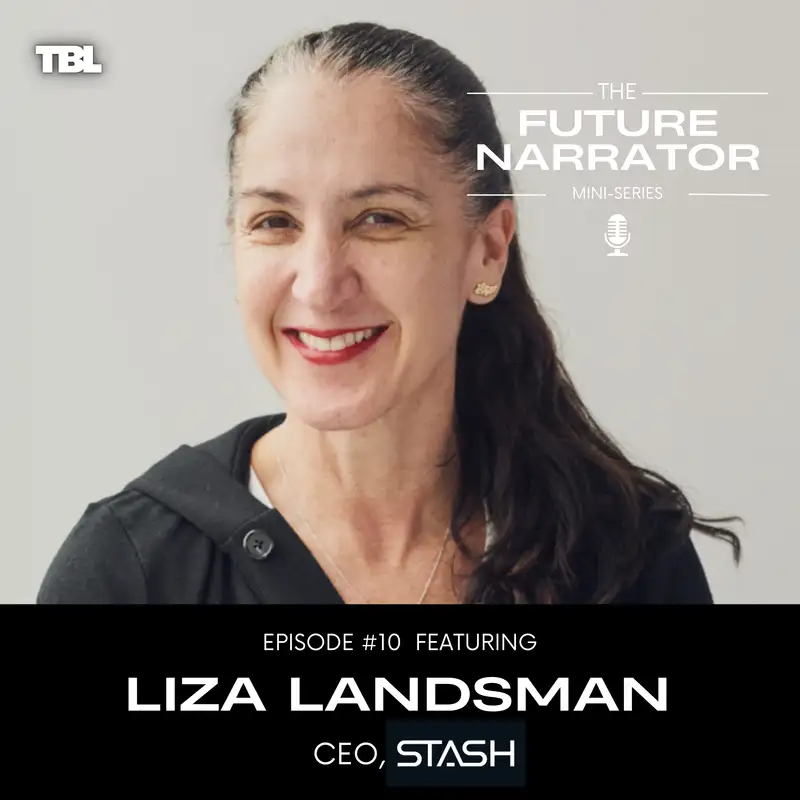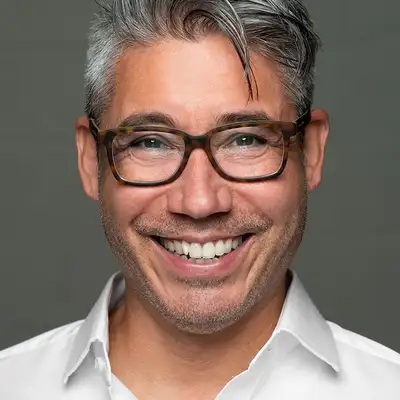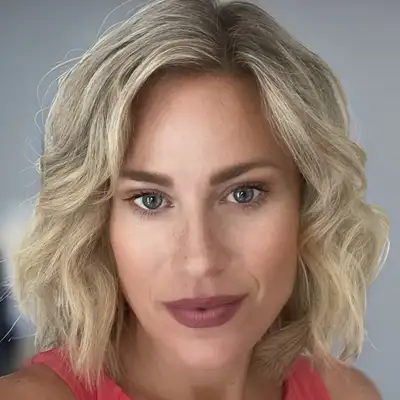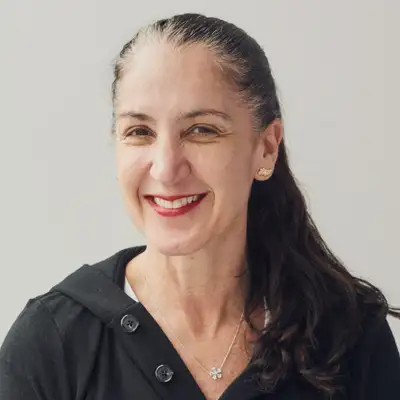Democratizing Wealth Management: Insights from Liza Landsman, CEO of Stash
Salli: [00:00:00] You're listening to the business leadership podcast with Edwin Frondoso.
Liza: If you make the problem smaller, rather than trying to lose 30 pounds, you say, how do I help you lose the first one pound? And it's the same thing with investing
Money is the place where people most want to avoid looking like they're asking dumb questions, and so they often won't ask the questions they need to ask of a financial planner or a customer service representative because they're embarrassed, but they will ask an AI bot because they know there's not another human on the other end.
Edwin: Good morning. Good afternoon. And good evening biz leader. Welcome to another episode of the business leadership podcast. I am your host Edwin Frondozo, and today we are featuring a special episode from our future narrate a mini series. Which was recorded live at the collision conference in [00:01:00] Toronto, Canada.
In this series, we explore the future of leadership, innovation, and storytelling. With visionary leaders who are not just designing products, but are creating entire new worlds and markets.
Joining me today is Dr. Paul Newton and together we'll be speaking with Liza Landsman. She is the CEO of Stash, bringing extensive expertise in scaling world-class organizations in consumer finance e-commerce and retail. In our conversation. Liza we'll discuss how stash addresses the underserved market of low. And middle-income consumers in the us through its financial tools and education.
We explore the challenges stash faces such as a nurture and financial literacy gaps and the role of AI in democratizing access to wealth management. So without further ado, Here we go.
We're now speaking with Liza Lansman, CEO of Stash. How are you [00:02:00] doing today? I'm great. So let's just jump right in. Can you share what problem is Stash solving for the gaps in wealth management?
Liza: Wealth management in the United States is a fantastic industry. If you happen to be one of the 12. 5 percent of U. S. households who is mass affluent, for everyone else, you have found yourself dramatically underserved for the last 50 years and that is the gap that Stash has stepped right into solving for financial security and wellness for low and middle income consumers.
Edwin: That's amazing and it's a very specific and a big gap it sounds.
Liza: It's a big gap because it's a big market.
Edwin: And I like big markets. So how do one start to solve that and what do you look at and where is the opportunities for those who are looking into this and looking at Stash or looking at even like wealth management as a whole?
Liza: The first thing to know about how you get started in this, ironically, is helping people get started. People often ask us, [00:03:00] who are your biggest competitors? When people are coming to you, where are they coming from? And the truth is the biggest thing we're fighting is inertia and fear of the dark.
Many people, our founders actually went out onto the streets of New York where they worked when they had this idea and started talking to people on the street, people working in coffee shops, taxi drivers, and said, one, are you an investor? And two, if not, why not? And the answer was, I don't think I have enough money.
And I'm not sure how to get started. And so they had this great concept, almost like Weight Watchers, which is if you make the problem smaller, rather than trying to lose 30 pounds, you say, how do I help you lose the first one pound? And it's the same thing with investing, which is don't think about, I have to be able to save a lot of money so I can start investing.
Just start investing with as little as one or 5. In fact, our average customer. Invest 30 at a time. So [00:04:00] really it's just about helping people realize and build confidence to get off the sidelines and then giving them the tools that let them learn by doing.
Edwin: I'm just curious I guess coming from my background and my history and maybe I'm going to be answering this myself, immigrant parents, like how did this gap or education or lack of education start within the U. S.?
Liza: That is a long answer about structural inequalities in most of the developed world. I come from a family of very little economic means. I was the first woman in my family to graduate college. And I came out into the working world also with almost no knowledge of how to save money or invest money.
In fact I often reflect that if I had a product like Stash in my twenties, I probably would have made a lot of different career choices because I really didn't start thinking about building any kind of assets until well into my thirties. But really It started because the financial services industry in the U. S. is [00:05:00] organized around the most efficient asset gathering mechanisms possible, and that industry started well before there were technological solutions that would allow people to do that in a much more cost effective way.
The promise of fintech has always been, can you democratize access in whatever category of financial services you're talking about? Could be neobanks, could be credit, in this instance it's wealth management or asset aggregation. But the advent of new technologies, whether it's cloud compute or AI, which allows you to provide much more scalable solutions to a much broader audience.
array of customers much more cost effectively, I think is what has unlocked the potential of allowing us to serve this underserved market in a much more effective and efficient way.
Edwin: And you mentioned AI and how would you say AI is revolutionizing now the FinTech or the financial industry?
Liza: AI is revolutionizing sectors all over the place, [00:06:00] not just FinTech. I highlight AI's current and potential impact on financial services and wealth management in particular.
First. There is an enormous amount of unstructured data and content out there in the space, and AI allows both providers of wealth management services, but also consumers of wealth management services to find more signal and less noise in all the content Second, There is a way we can double down on driving greater cost efficiencies because whether it is in customer service or portfolio construction, there's just a big opportunity to allow humans to only do the greatest value add of activities and let AI do a lot of the tasks that historically have had to be effectively sneaker brigaded by more humans.
And the third I would say is that particularly in wealth management, humans often, even though they are much more comfortable interacting digitally, if you ask [00:07:00] someone how they want to invest, they'll say I want to talk to someone about my financial well being. I need to talk to someone about a plan and I actually gives us a scalable way to effectively simulate a much more conversational interface typically handled by a standard.
Let's call it F A Q or website interface. And I honestly think it is one of the more interesting aspects of what we've learned. We have in our app, something which we call AI money coach. And it just allows customers to interact in an incredibly conversational manner and ask specific questions about like, how should I get started or what should I invest in next, but also generic things like what is diversification?
And the big insight we took away from the thousands and thousands of conversations we've logged is that. Money is the place where people most want to avoid looking like they're asking dumb questions, they often [00:08:00] won't ask the questions they need to ask of a financial planner or a customer service representative because they're embarrassed, but they will ask an AI bot because they know there's not another human on the other end.
it's been a fascinating learning for us and a great feedback loop to feed all of that good. Stimuli of what's on our customers minds back into our product, into our content, into our customer service messaging.
Edwin: That's a really interesting point of view and I was thinking about my own like learnings when it became to financial literacy Was like I think I was that person. I never wanted to tell people that I didn't know anything. Yeah,
Liza: No one teaches you stuff, this stuff, and yet everyone is expected to know it. And so I think that is a, we're, at the very earliest innings of scratching the potential for AI in this category.
Edwin: Oh, that's great. I love that.
I'm curious, from your point of view, what does a future of, [00:09:00] quote, everyday people gaining financial freedom and empowerment, end quote, look like?
Liza: I think. Financial empowerment and financial security really come from having a sense of confidence and control over your finances. I think there's an important role for companies like Stash to play in helping people get off the sidelines, build that confidence, build that knowledge base and build those assets.
I think there's an important role for employers to play in this. One of the reasons that we at Stash, which has historically been a direct to consumer business, launched a B2B offering earlier this summer called Stashworks is because we know employers worry about financial insecurity as a big source of absenteeism and attrition, but also because employees are looking to their employers in the same way they look to them as a source of physical well being through health care and employment. Other kinds of wellness products also as a source of truth for [00:10:00] financial wellness and support.
Edwin: And that's a great point of view and a great distribution and partnership model for absolute financial literacy because everyone goes to the workforce as fast as possible.
Liza: Yeah, and if you think about the value chain, when you are trying to decide what to do with your paycheck on a regular basis, there's never a more powerful moment to think about paying yourself first as when you are receiving your pay.
So whether you are saving for a short or midterm goal or putting money away for retirement or putting money in an account for your kid to save for college, the closer you get to that sort of initiation point that is through employers, the more powerful it is. Because one of the things we have found is people who do something with us called auto stash, which is just automatically deducting a small amount every week, every two weeks, every month from their paycheck.
They on average save in their first year with us about 900. Wow. When you think [00:11:00] about more than half of America does not have 500 set aside, and these are not the wealthiest folks. This is just compared to people with the same income as they have.
Edwin: That's such an amazing stat in terms of just automatically having people save and learn financial literacy.
What have you seen with the data or with your customer base after they get through that first year? Did they have the increase their financial literacy? When?
Liza: One of the things we found, and this is true across the board, is that once people have amassed 500 in assets, they stick with that behavior.
Now, part of that just comes from the economic reality, which is if you don't have 500 all in one place, the likelihood that one unexpected expense could undo any amount of asset gathering you might've had. When we talk to customers, one of the reasons that we hear most frequently for people taking distributions off the platform earlier than they might have wanted to, Is they either have an unexpected medical bill, or a fender bender, or some just daily [00:12:00] expense. And because many of these people, as I said, this is the first and only place they are trying to accumulate assets. They don't have 400 sitting someplace else to pay for the deductible on their car insurance.
Edwin: This is a little personal question, it just came to mind. So my daughter just turned 8.
And I gave her. Great time to start. So I gave her, and maybe you have the data, I gave her sort of like a cash card where she could save. It's like a cash a MasterCard cash card. Okay. And have you seen within the data or in the research when it really, makes it powerful to start learning because I never learned this stuff at eight years old.
Liza: Yeah and my father has this saying, he did not invent it, but he's the person I heard it from most, which is when is the best time to plant a tree? 20 years ago. And this is powerfully true for investing also. I think somewhere between eight to 12 is probably the right younger than that. They probably don't really understand what you're doing and what value with them.
I will tell you, both of my kids started having [00:13:00] stash did not exist when they were that little cause they're now in their twenties, but savings books like past book savings and when they were 12 or 13, they both still have those accounts. They both still regularly contribute. It is like any other.
learned behavior, the more you practice it and the more it becomes a habit and the less you actively think about am I gonna do this or not do this, the more you continue on that healthy path. It's just like working out.
Edwin: 100 percent and the difference for my eight year old, the difference between wanting something and needing something.
Now we have the conversation like, are you sure you want that? We could use your cash card.
Liza: Look, that is the most powerful differentiation. We talk about this all the time. In part of our educational content, as we help people through the product, set goals, a big part of setting goals is understanding the difference between want and need, and it's okay to want things as long as you have actually covered the things you need first.
Edwin: And think about it.
Liza: And think about [00:14:00] it,
Edwin: In the business leadership podcast, we always talk about, and we like to share what people are learning, especially from the challenges given to.
The undertaking of stash and what you're growing. What are the biggest challenges you personally face now with the business?
Liza: One of the biggest challenges we face now, and I feel it as the CEO quite dramatically is one I highlighted for you before, which is I was a physics major undergrad. The most powerful force in the universe is inertia, right?
And object at rest tends to stay at rest. The thing that we fight against all the time is getting people off the sidelines, and that continues to be true. And certainly, in an environment where food costs more, energy costs more people almost always still have five dollars a week to set aside, but mentally, knowing that, when you are struggling to
figure out, my gosh, am I gonna have the price of eggs has gone up so much.
Am I going to have enough to cover that bill is real. [00:15:00] And part of the reason we've developed the product, the wave that we've developed, it is to let people like do what feels doable for them as opposed to setting some arbitrary minimums as many other platforms do.
Edwin: Question as we're sitting here in Toronto, Canada, this currently available in
Liza: U.S. Only for now, but sky's the limit. I mean it wouldn't be a tech startup if we didn't have plans for world domination. And if the OCC is listening, I'm just kidding.
Edwin: Curious what is your vision for Stash of the future and what you guys are all building now?
Liza: That every low and middle income consumer in America has Stash in his, her, or their pocket.
Edwin: And as you lead Your company, your team, your stakeholders, how do you lead them and inspire them with the inertia and everything?
Liza: I am unbelievably fortunate. And here's why. Every single person at stash to a person is there because they are compelled [00:16:00] by the mission. When I first joined a little over a year ago, I did a little road show and went around to all the regions where we have employees and tried to meet every single employee of the business.
And whether the person was coming from, we had people coming from Goldman, people who were former school teachers, people who were at GitHub. I could, it was a range. And when I would ask them, what drew you to Stash? People often had specific things about people I like to work with, or this work is super innovative, but every single person said, but of course, I'm really here for the mission.
So in my role as leader, I just keep get to keep pointing at this great north star of the mission that the business was founded on. Still is true today. Couldn't be more relevant. And people who work there are genuinely inspired by it because they want to be at a place that leads through both great innovation, but also empathy.
What does the world look like when every [00:17:00] lower middle income person has stash? There was a study a couple of years ago that said, at least in the U. S., people now think about, and because they're worried about money, more times a day than they think about sex. I don't know, maybe there's a baby boom.
But it is the alleviation of worry. Kidding aside, money is the greatest source of stress and anxiety among Americans. And so if you can alleviate that, it Unlocks the possibility for so many other things. It's interesting. I never thought I would work in consumer finance or financial services as long as I have.
And I've worked at Citigroup and BlackRock and E Trade. But I, when I first started working in the category, I thought this is I really want to go back to hardcore tech, but when I started getting into the space, I realized how people spend, save and invest is the purest expression of their values.
And what could be more powerful than helping people fulfill their dreams through getting rid of the worry about [00:18:00] finance.
Edwin: That's great, I appreciate that. Liza, I'd love it if you could share any final thoughts, recommendations to the business leaders, executives, and maybe founders who might be listening out there.
Liza: I am Not always a big believer in the do what you love, which I know for people to do what they're great at, if it's something that other people love but I would say no matter what you're doing, get off the sidelines.
Edwin: I love that. Liza, it's been an absolute pleasure. Thank you for joining us today.
Liza: Thank you for having me.
Edwin: That's it. Biz leader. Thank you for joining me on this special episode. Or the business leadership podcast. Part of our future narrative mini series recorded at the collision conference. This was an amazing conversation with Liza Landsman, just exploring how stash is empowering low and middle income consumers through innovative financial tools. And education.
So for links to all the resources that we discussed to connect with Liza. And to learn more about the [00:19:00] future narrative project. Check the show notes within the app you are listening to right now. And if you are interested in reading more about Liza and the other amazing business leaders that we profiled. Please do join the wait list for our upcoming book.
And by the way, If you have found value in this episode, please do subscribe rate and share it with the very first person who comes to mind that could benefit. From hearing about stash and would be Uber grateful from hearing from you. Your support helps us grow and it empowers us to create more great content. So thanks again for tuning in and being a part of our business leadership community. Until next time have a 100 X day.





